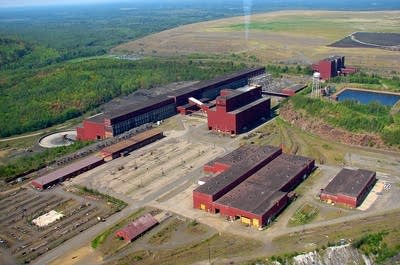State board gets potential stake in PolyMet mining project
Go Deeper.
Create an account or log in to save stories.
Like this?
Thanks for liking this story! We have added it to a list of your favorite stories.

A state agency could become part owner of a controversial copper-nickel mine proposed in northern Minnesota.
The state's Iron Range Resources agency has approved a loan package that gives it an opportunity to purchase PolyMet stock.
Environmentalists are blasting the arrangement for giving the state a financial interest in a project that's still under review by state agencies.
The deal provides PolyMet mining a $4 million loan that allows the company to purchase two pieces of privately owned land. The company would then trade that land to the U.S. Forest Service for other property the company hopes to mine.
Turn Up Your Support
MPR News helps you turn down the noise and build shared understanding. Turn up your support for this public resource and keep trusted journalism accessible to all.
The loan deal is mostly conventional, giving the Iron Range Resources agency, a 5 percent interest on the loan, and putting up the land as collateral. But the deal also includes stock warrants -- which give the agency the right to purchase up to 400,000 shares of PolyMet stock at $2.50 a share.
That's only slightly higher than where the stock has been trading this week, and below the stock's five-year average price. If the company's share price rises above $2.50, Iron Range Resources would make a profit.
The deal comes at a time when the state Department of Natural Resources is overseeing environmental studies still underway on the PolyMet project. Operating permits will have to come from agencies including the Department and the state Pollution Control Agency.
Environmental groups strongly oppose the mine. Copper nickel mining has a track record of leaving sulfuric acid pollution, and the Polymet site is close to the Boundary Waters Canoe Area Wilderness.
With permits still pending the Iron Range Resources deal doesn't look right, said Scott Strand, executive director of the Minnesota Center for Environmental Advocacy.
Strand said allowing the agency to own part of the mine creates an inherent conflict. He wonders what would happen if the regulator's actions affect the cost structure of the company.

"That would impact that state's bottom line, and I think that's problematic," he said.
Paula Maccabee, staff attorney with the group WaterLegacy, said the Iron Range loan package raises red flags.
"The PolyMet company doesn't need the money," Maccabee said. "They've told as much to the local folks. What they're using the potential investment for is to create a conflict of interest. If the state is an investor in the PolyMet project, it's going to taint the potential objectivity in regulatory review."
Maccabee said it's inappropriate for the Iron Range Resources to be involved in this process.
PolyMet President and CEO Joe Scipioni said it's a good business deal, and doesn't affect the DNR's work on the company's environmental reviews.
"It really doesn't change the environmental aspects of it," Scipioni said. "We're going through all of the permitting and environmental review. Whether you do something with this or whether it doesn't happen, that's not going to change it. It's just a good business deal for both sides, so we did it."
An official with the Minnesota Pollution Control Agency referred a question about a potential conflict of interest to the Minnesota Department of Natural Resources, saying the DNR is the lead agency for the environmental review. A DNR official Thursday referred questions to Iron Range Resources. Late Friday afternoon, spokesman Steven Colvin responded in an email: "DNR staff became aware of the loan through media reports and it has not had an effect on our work in preparing the supplemental draft EIS [Environmental Impact Statement]."
IRR Commissioner Sandy Layman, whose term ends this month, said she sees no conflict of interest because the agency is involved in development, and is not a regulatory agency.
"I think there would be a conflict if one agency both regulated and promoted a project, but in this case they're entirely separate agencies with different missions," Layman said.
State Sen. Dave Tomassoni, DFL-Chisolm, who chairs the IRR, said the stock warrants make no difference in the environmental studies, since they wouldn't be cashed unless the reviews are complete and the company is in business.
In the context of state finances, the dollars involved are relatively small. Even if Polymet's stock soars to $10 a share, the state's profit would be $3 million, which is about one one-hundredth of a percent of the state's two-year budget.
PolyMet, meanwhile continues work on its draft environmental studies, and expects to complete them in the summer.
EDITOR'S NOTE: This story has been updated from the original version. It now includes a response from both the MPCA and the DNR.




